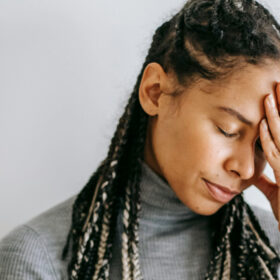
Does perimenopause make you feel tired?
In this article
What's the lowdown?
Tiredness and fatigue are common symptoms during perimenopause
There are lots of tips you can use to improve your sleep
If home remedies and lifestyle changes are not helping, medication can be useful
If you’re feeling tired all the time, but have no other symptoms of menopause, your fatigue could be due to something else, and you should see a doctor to discuss this.
What is perimenopause?
Perimenopause is the time during your life before menopause. During this time, the amount of hormones produced by your ovaries changes, leading to a reduction in oestrogen levels and fluctuating levels of progesterone – which are the 2 main female hormones.
The hormonal changes that lead up to menopause can take place over many years. The average age of starting perimenopause can vary widely and is thought to be influenced by your genetics and some lifestyle factors, such as nutrition, stress, and sleep deprivation1.
There are a wide variety of symptoms that women experience during perimenopause, and everyone’s experience differs. You can find more information about these symptoms on our menopause symptom checker.
Can perimenopause cause fatigue?
Yes! Sleep issues are very common during perimenopause, which can lead to fatigue. Studies indicate that sleeping difficulties can include difficulty falling asleep, waking up frequently in the night, or waking up and struggling to get back to sleep. This affects up to 50% of women going through perimenopause2.
Why am I so tired during perimenopause?
The fatigue that many women experience around perimenopause can be caused by the changes in levels of hormones produced by our ovaries. These changes lead to changes in our menstrual cycles, but can also have an impact on the quality of sleep.
This is because:
- Oestrogen plays a role in the production of serotonin, which regulates our sleep-wake cycle. So when oestrogen falls in perimenopause, it’s understandable that sleep-cycles can change.
- Progesterone levels fluctuate during perimenopause. Higher levels of progesterone can lead to deeper sleep. So, levels of progesterone rising and falling can lead to restlessness at night.
Changing levels of hormones can also lead to hot flushes and night sweats, which can also exacerbate things3. Of course, if you are waking frequently feeling hot and sweaty, then this will impact the quality of your sleep and leave you feeling tired4.
We know that for many women, sleep issues and fatigue can be a feature of their perimenopause transition, and can sometimes persist. However, there are lots of non-medical and medical options you can use to improve things.
Could something else be making me tired?
Fatigue can be one of the first symptoms of perimenopause, so if you are feeling tired with no clear reason, perimenopause may be to blame. However, remember that there are also lots of other issues that can cause fatigue, such as medical conditions, and also our general lifestyle.
If your tiredness is a menopause symptom, it’s most likely that you will have other menopausal symptoms. Some common menopausal symptoms include:
- Sleeping problems
- Hot flushes
- Night sweats
- Joint pain
- Changes to mood
- Changes to memory
- Vaginal dryness
- Painful sex
If you don’t think you have any other menopausal symptoms but are struggling with tiredness, then a medical condition may be to blame. Some of the other common reasons for tiredness are:
- Low vitamin D
- Low B12
- Anaemia (low levels of red blood cells) or low iron
- Hypothyroidism (an under-active thyroid gland)
- Depression
Being more tired before your period or being more tired during your period could be a result of heavy bleeding, which is yet another common symptom of perimenopause! Heavy bleeding can lead to low iron levels and anaemia, which are both common causes of tiredness.
Most of these causes can be excluded by speaking to a healthcare professional and having some simple blood tests. Get some further advice if you’re not sure.
Don’t forget that your lifestyle can also massively impact your energy levels and sleep. Exercise, sunlight, a healthy diet and reducing stress and screentime all improve your sleep. So if you are going through a stressful phase, eating more takeaways and having more Netflix binges, these could be to blame.
How can I improve my sleep during perimenopause?
Because there are so many differences in how women experience sleep problems during perimenopause, there is no single ‘right answer’ for what will improve the problem for you. You may need to try several different options to find something suitable5.
Some basics:
- Sleep hygiene: Try to go to bed and wake up at the same time each day.
- Regular exercise (in daylight, if possible).
- Room temperature: try and maintain a temperature of below 19°C and ensure your room is dark and quiet.
- Watch your diet: Large meals, caffeine and alcohol can interfere with your ability to fall asleep and lead to you waking up more frequently overnight.
We have a dedicated article on how to improve sleep in perimenopause.
There are some other therapies that may help you:
- Sedating antihistamines6 (the same as you might use for allergies or hayfever), can help. Examples include drugs such as chlorpheniramine or promethazine (antihistamines which causes drowsiness) can be bought from pharmacies. These may be useful for short-term relief, but doctors don’t recommend them for long term use6 .
- Over-the-counter sleeping aids may contain synthetic melatonin, which is a hormone. Melatonin helps us rest and have a more regular sleep cycle.
- Sometimes cognitive-behavioural therapy for insomnia (CBT-I) is recommended. This is a specialist technique which aims to modify thought patterns and behaviours6
Medical treatments for fatigue in perimenopause?
If you’ve had insomnia for several weeks or more, you should talk to your doctor. Without proper rest, you can end up suffering with other health concerns, including cardiovascular problems and low mood.
Hormone replacement therapy (HRT) with oestrogen and progesterone may help with poor sleep and fatigue in perimenopause. The progesterone component of hormone replacement therapy can cause drowsiness, which may help you sleep more deeply7. HRT may also help with other symptoms in the perimenopause period7. Speak to your GP to decide if this is a suitable treatment for you.
There are other medicines that can be prescribed for sleep problems but they tend to only be used in the most severe cases. This is because they can cause addiction, and dependency on the medication.
Sleep issues can have a significant impact on your quality of life, and you don’t have to put up with them. If you are not sure whether perimenopause is causing the issue, or you have tried some self-help techniques but are still suffering, you should speak to a healthcare professional.
Our medical review process
This article has been medically reviewed for factual and up to date information by a Lowdown doctor.

